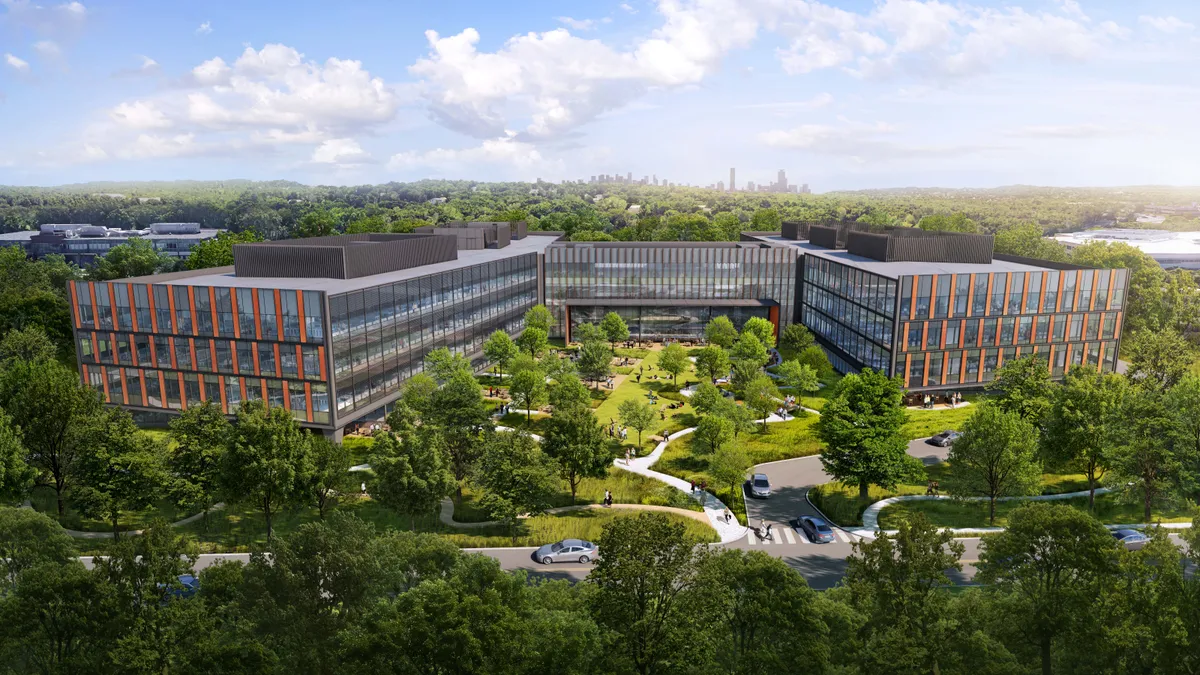Gilbane Building Company CEO Mike McKelvy notes that COVID-19 is not the first pandemic that his company has faced.
Founded in 1870, Gilbane was in operation during the Spanish flu pandemic of 1918 to 1920. Now, the contractor is expanding its corporate presence in Boston, where it has worked since 1946. Projects underway in the area include the 225 Wyman Street office and lab development, pictured above.
Both McKelvy and newly appointed executive vice president Daniel M. Gilbane have relocated to the Boston office, located in the city's Seaport neighborhood, in a move to bolster the firm's presence there, the company announced. Executive vice president Ryan E. Hutchins is already located there.
Gilbane, which says it is the largest construction management firm headquartered in the New England region, will keep its main office in Providence, Rhode Island, McKelvy told Construction Dive.
"The pandemic put a bit of a hold on strategic plans of 2020," McKelvy said. "We're re-teed up now as we go into the middle of 2021. In order to capitalize on the market opportunities, we've got to grow. The timing is perfect, really."
The contractor employs 175 people in Massachusetts right now, and it's hiring more to expand its team in the region, McKelvy said.
Gilbane chose to focus on Boston due to its attractive talent pool, especially recent graduates of the area's plentiful universities; the proximity the city provides for high-tech customers; and the global business Boston brings in, McKelvy said.
In addition to the news about its corporate shift, McKelvy talked with Construction Dive about some of the ongoing issues construction faces, and how Gilbane is handling them.
Vaccines
Gilbane is encouraging workers to get COVID-19 vaccinations, McKelvy said. The contractor has a voluntary system where employees can share whether or not they have received the vaccine.
Integrity is important to Gilbane, McKelvy said, so the company depends on and expects its workers' honesty about their vaccination status.
While Gilbane doesn't mandate vaccinations, some project owners require everyone on a project to be vaccinated, McKelvy said. Gilbane allows workers to volunteer that information to them, but he said project owners asking for a fully vaccinated jobsite is common, and that could continue to grow.
Materials and the supply chain
The price of steel has increased, while lumber has fallen slightly, although it remains at a higher price this year due to COVID-19 and effects on the supply chain. McKelvy said he anticipates dealing with high material costs for months, which, as a result, will likely cause clients to pause or simply not move forward on certain jobs. Others will have to redesign projects or reassess their plans.
Nevertheless, McKelvy said, much of the work that companies like Gilbane are doing today involve material prices that were locked in before they skyrocketed to their present state. As a result, high material prices will have a bigger impact on work that's being bid out this year, he said, and will ripple through 2023.
"I think [the construction] industry was expecting a two-year recovery. The supply chain was also looking at a slow recovery," McKelvy said. "What we've had is a much quicker recovery, and it has put a real tight squeeze on the supply chain."
Worker shortages
A bigger concern for McKelvy is the lack of qualified people, which he described as the "real supply chain shortage."
Before the pandemic began, there was a race to soak up the shrinking talent pool in construction, architecture and engineering, McKelvy said. Since the start of the pandemic, not only have some of the most experienced members of the workforce retired, but existing workers have left the industry, while fewer new workers joined.
"It's critical we continue to attract more people in our industry," McKelvy said. "That's why diversity, equity and inclusion is important. It's the right thing to do, and it'll help us get more people, to attract new talent and to retain the talent we have."
Efforts to promote diversity and inclusion at Gilbane include a council geared to promoting workforce diversity, inclusive work culture, economic inclusion, supplier diversity and community outreach. The contractor also has a 20% corporate diverse and small company participation goal, as a benchmark for working with minority- and women-owned business enterprises.
McKelvy said he is optimistic that the Boston office will help Gilbane attract new talent, especially young engineering and architecture professionals in the area.
"We hope to leverage that connectivity with the brain trust of the university world of the people in Boston, and partner with those different institutions," he said.














